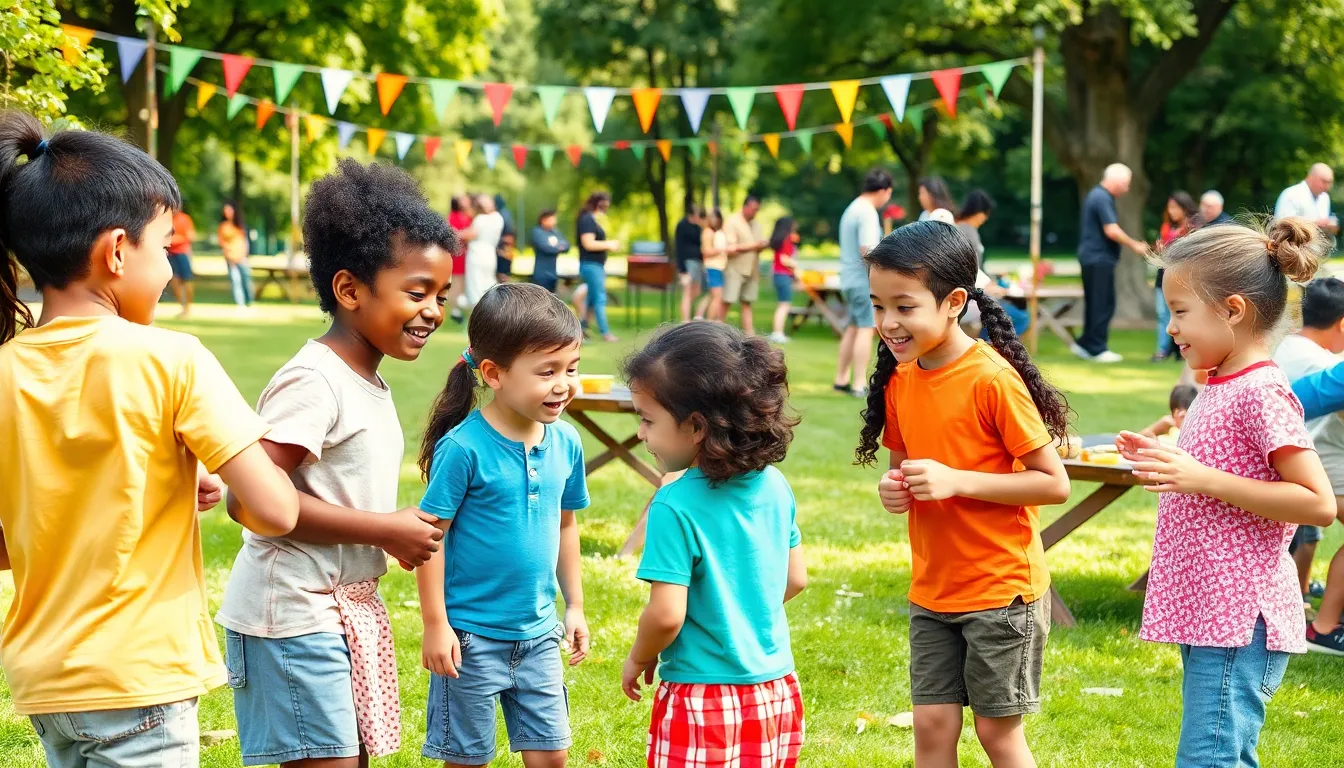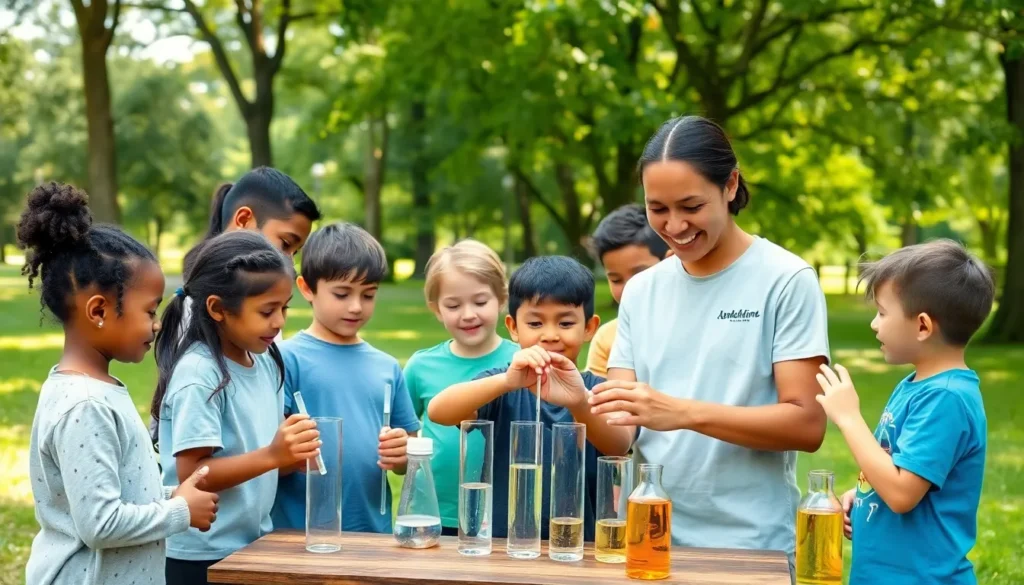Table of Contents
ToggleIn the world of homeschooling, the kitchen table isn’t the only place where learning happens. Imagine a vibrant community where kids swap textbooks for field trips and math problems for science experiments in the great outdoors. Homeschool community activities are the secret sauce that spices up education and turns learning into an adventure.
Overview of Homeschool Community Activities
Homeschool community activities create opportunities for social interaction and experiential learning. These activities often include field trips that expose children to diverse environments such as museums, nature centers, and historical sites. Engaging in practical learning experiences enhances retention and understanding of academic concepts.
Outdoor science experiments allow children to explore their surroundings while applying scientific principles. Local parks serve as excellent venues for these activities, facilitating hands-on learning in a natural setting. Group projects foster collaboration and teamwork, essential skills for future success.
Art classes offer creative outlets where children express their individuality while developing artistic skills. Local artisans and community centers frequently host these classes, providing access to professional instruction and resources. Workshops also present chances to learn new skills, ranging from woodworking to coding.
Regular meet-ups and social events strengthen connections among homeschool families. Potlucks, game nights, and holiday celebrations cultivate a sense of belonging and community support. Such activities not only build friendships but also provide a network for sharing resources and advice.
Field days and sports activities bring an element of physical fitness to the homeschool experience. Cooperation and sportsmanship become tangible lessons during these events. Families that participate can find local leagues or organize their own informal games.
Through these varied activities, homeschool communities encourage balanced development. Each experience plays a role in nurturing well-rounded individuals prepared for future challenges. Parents and children benefit from the diverse opportunities available, enriching their educational journey.
Benefits of Participating in Community Activities

Participating in community activities offers numerous advantages for homeschool families. Engagement in these activities fosters connections among children and their peers, promoting critical socialization.
Socialization Opportunities
Socialization takes precedence in homeschool communities. Children interact with diverse age groups through outings, fostering friendships that enhance their social skills. They share experiences during group activities, contributing to a sense of belonging. Collaboration in projects and discussions cultivates communication skills, preparing children for future interactions. Community events, such as potlucks and game nights, create environments where families connect, strengthening partnerships. Through these interactions, children develop empathy and cooperation, essential traits for effective teamwork.
Enhanced Learning Experiences
Enhanced learning experiences arise from community engagement. Field trips expose children to real-world applications of academic concepts, making learning relevant and exciting. Visiting museums, nature centers, and historical sites stimulates curiosity, encouraging exploration. Outdoor science experiments broaden understanding while allowing hands-on participation. Art classes and workshops offer creative expression, allowing children to learn new skills in enjoyable settings. Regular community activities enrich education, blending fun with knowledge, resulting in well-rounded learning outcomes. Such experiences deepen understanding, enhancing educational journeys for both children and parents.
Types of Homeschool Community Activities
Homeschool community activities come in various forms that support learning and social development.
Field Trips and Educational Outings
Field trips provide valuable experiential learning opportunities for homeschoolers. Visits to local museums, historical sites, and nature centers enhance understanding by connecting theory to real-world experiences. Students can explore exhibits that stimulate curiosity and foster discussions. Activities during these outings, like guided tours and interactive exhibits, further engage learners. Many families find that when education includes hands-on experiences, students retain information better, making learning enjoyable and effective.
Group Sports and Physical Activities
Group sports build teamwork skills and physical fitness among homeschoolers. Activities such as soccer, basketball, and swimming create opportunities for exercise within a supportive environment. These physical activities often involve community leagues or organized playdates, making participation easy and fun. Through sports, children develop important values like cooperation and perseverance. Engaging in friendly competition fosters strong relationships among peers, encouraging a sense of belonging within the homeschool community.
Arts and Crafts Workshops
Arts and crafts workshops allow children to explore creativity while developing new skills. Homeschool communities often host regular sessions where kids can learn various techniques, such as painting, pottery, or sewing. Engaging in artistic activities encourages self-expression and imagination in participants. Workshops also promote collaboration as students share ideas and techniques with each other. Parents appreciate that these activities nurture creativity while providing an enjoyable and relaxed atmosphere.
Science Fairs and Competitions
Science fairs and competitions inspire scientific inquiry and exploration among students. Participants can present their experiments, enhancing public speaking and critical thinking skills. Setting goals for these projects encourages organization and accountability. Often, families participate together, fostering collaboration and excitement in the learning journey. Community members frequently celebrate the achievements of all students, creating a supportive environment that values effort and innovation.
How to Find and Organize Community Activities
Finding and organizing community activities for homeschoolers involves leveraging local resources and online platforms, along with effective planning. Engaging with local networks fosters connections and supports activities that benefit all families involved.
Local Homeschool Groups and Networks
Local homeschool groups often serve as vital resources for discovering activities. These groups frequently host events like field trips, educational workshops, and social gatherings. By connecting with nearby families passionate about homeschooling, members can exchange ideas and plans for joint activities. Additionally, local libraries and community centers may list events specifically tailored for homeschoolers, further enriching the community experience.
Online Resources and Social Media
Online platforms offer extensive resources for families seeking community activities. Websites dedicated to homeschooling often feature event calendars, articles, and forums for discussion. Social media groups on platforms like Facebook allow members to share local events, encourage participation, and announce new initiatives. These digital spaces facilitate meaningful connections, fostering relationships among homeschool families across broader geographical locations.
Planning and Coordination Tips
Effective planning ensures successful community activities. Establish a clear objective for each event, whether educational or social. Create a checklist to outline necessary materials and tasks, allowing for organized events. Communicate regularly with all participants to confirm details and encourage participation. Utilize shared calendars to coordinate schedules, ensuring families stay informed and engaged in upcoming activities.
Homeschool community activities play a pivotal role in enriching the educational journey for families. By stepping outside traditional learning environments, these activities foster deeper connections among children and parents alike. They not only enhance academic understanding through hands-on experiences but also cultivate essential social skills.
Engaging in diverse activities like field trips and workshops allows children to explore their interests while developing teamwork and cooperation. The sense of belonging that comes from participating in a supportive community cannot be overstated. As families embrace these opportunities, they create lasting memories and friendships that contribute to a well-rounded education.







